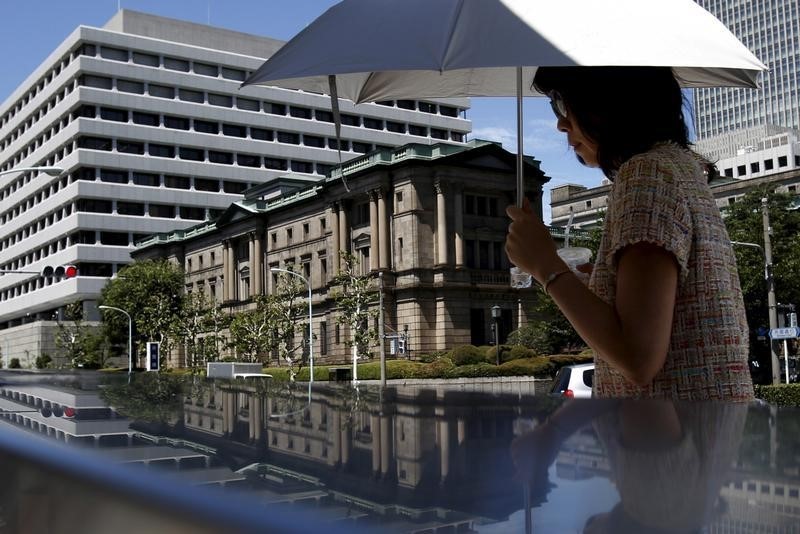By Leika Kihara
TOKYO (Reuters) - The Bank of Japan is expected to hold monetary policy steady on Wednesday, preferring to save its limited options while hoping that a tightening job market will lift wages and consumption enough to offset the pain from China's slowdown.
The BOJ is likely to remain under pressure to ease at a more crucial meeting on Oct. 30, when it is expected to cut its long-term economic and price projections due to sluggish exports and renewed oil price falls.
Some investors speculate that Governor Haruhiko Kuroda may ease this week to spring a surprise. But the chance of this happening is slim with many policymakers hesitant to expand an already radical programme, say sources familiar with the BOJ's thinking.
Instead, the BOJ is expected to maintain its pledge to increase base money at an annual pace of 80 trillion yen ($667 billion) on Wednesday.
"Kuroda sounds upbeat on the economy, blaming low inflation on oil. The BOJ probably won't act this week just to surprise markets," said Izuru Kato, chief economist at Totan Research.
A run of weak data has cast doubt on the BOJ's scenario that improvements in the economy will allow companies to pass on higher costs to households, helping accelerate inflation toward its 2 percent target by around September next year.
Kuroda stressed last week an uptrend in inflation remains intact, signalling that there was no impending easing.
He has also said the BOJ will look beyond the effect of oil moves on inflation and won't act unless companies become gloomy enough to slash investment plans and stop raising prices.
But some investors point to various factors that could spur the BOJ into action on Oct. 30, if not this week.
Premier Shinzo Abe will reshuffle his cabinet on Wednesday in a bid to boost his falling approval ratings, and Kuroda has a record of timing key policy moves with the government.
There are also similarities to last October, when the BOJ stunned markets by easing policy despite giving assurances that Japan was on track to hit its 2 percent inflation target.
Like last October, slumping oil prices are weighing on inflation. Weak output has heightened the chance Japan may have slipped into recession in July-September.
The BOJ argues that consumption is stronger now, while companies are retaining their upbeat investment plans.
But BOJ policymakers are hardly complacent, with some fretting that growth may not rebound much for the rest of this year as exporters were facing waning demand in Asia.
Firms cut long-term inflation projections in a quarterly survey, contradicting the BOJ's view its huge money printing is eradicating deflation.
BOJ officials acknowledge the timing for hitting their inflation target would be pushed back on Oct. 30, keeping them under pressure to expand stimulus this month.
"Forgoing easing could hurt the BOJ's credibility and trigger a yen rise," said Masaaki Kanno, chief Japan economist at JPMorgan (NYSE:JPM) Securities, who expects an easing on Oct. 30.

($1 = 119.9400 yen)